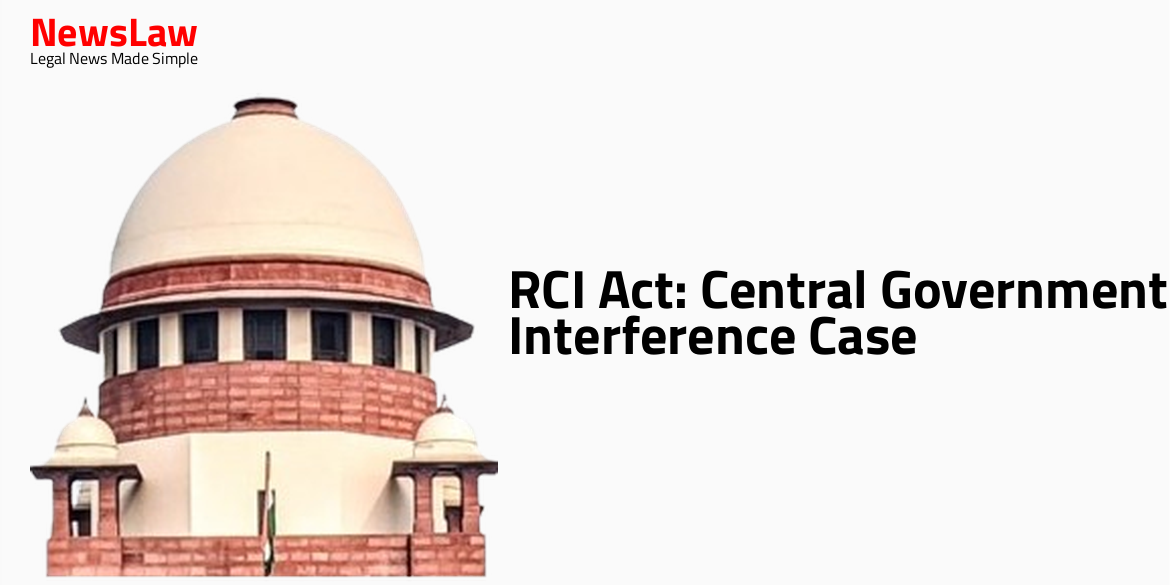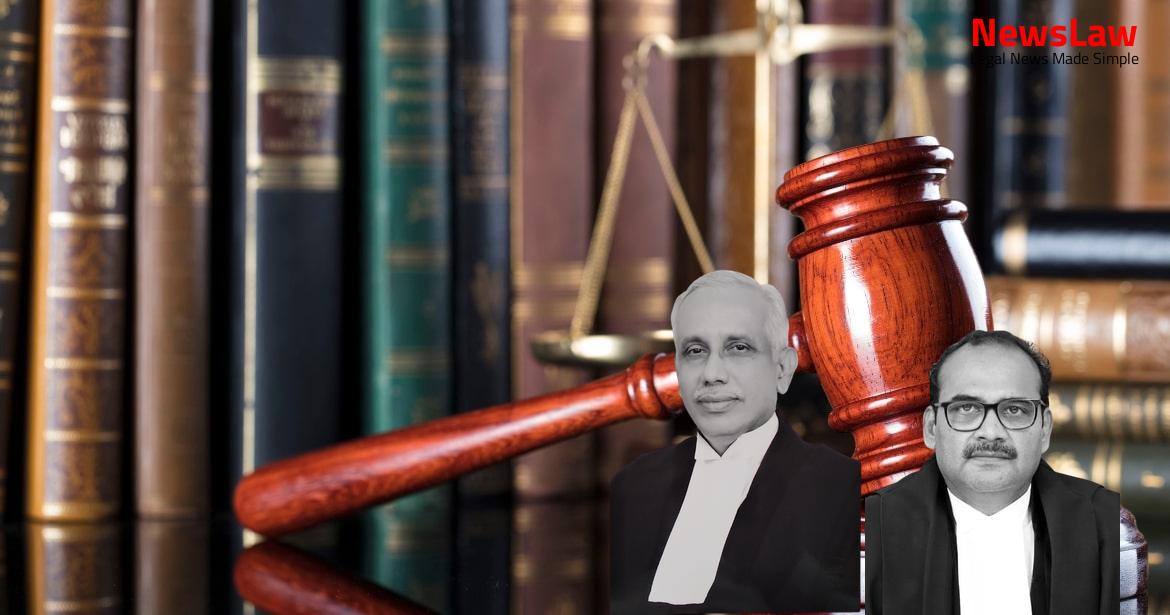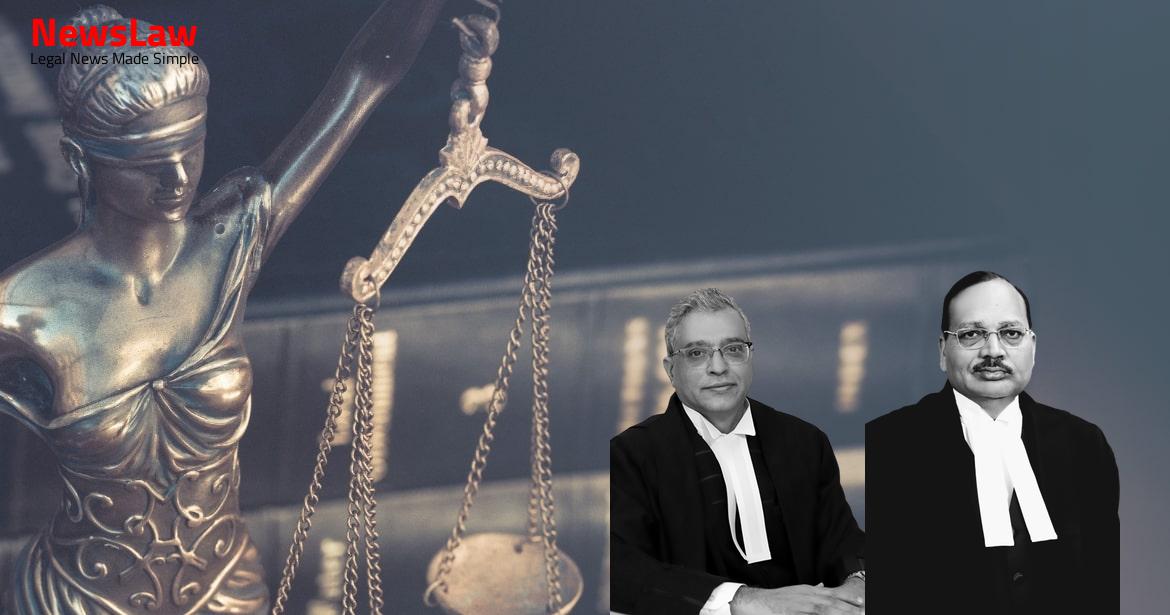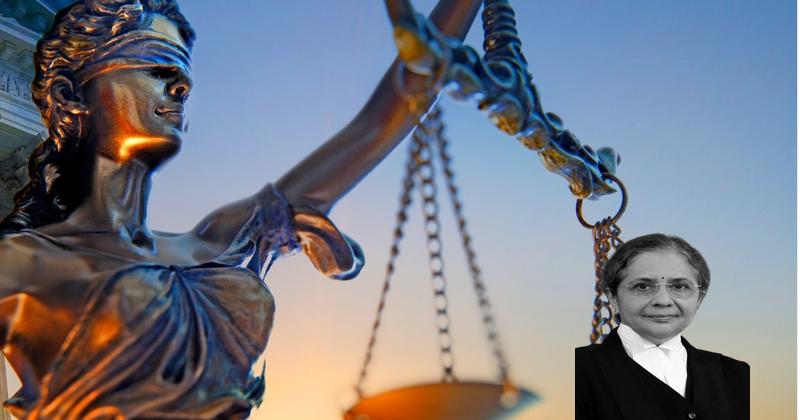A significant legal case involving the RCI Act and Central Government interference has been concluded by the Delhi High Court. The case raised concerns regarding the decisions made on applications for Special Education courses, impacting over 571 institutions. The petitioners challenged the decision to return their applications, citing arbitrary actions by the respondent. Stay tuned to learn more about the court’s ruling and its implications on academic standards and government authority in educational matters.
Facts
- The petitioners have set up their infrastructure based on invitations by the RCI and conform to the norms and standards prescribed by the RCI.
- Guidelines were issued with effect from the 2020-2021 academic session.
- On 9 March 2023, a circular was issued by the RCI after their 87th meeting held on 15 February 2023.
- Circular dated 1 June 2023 was issued.
- The petitioners have filed writ petitions challenging the decision to return their applications and increase the number of seats in existing institutions.
- Regulation 24 requires institutes to adopt RCI recommended standards.
- RCI issues guidelines governing applications for establishing institutions providing Special Education courses.
- RCI also allows enhancement of intake in colleges already providing Special Education courses.
- The grievance of the petitioners arises from vacillating decisions reflected in circulars from the RCI.
- Regulation 24 mandates institutes to obtain prior approval from RCI or the Central Government for starting a Special Education course.
- The Court must determine if the respondents’ refusal to process the petitioners’ applications was lawful.
- The Court must also assess if allowing an increase in seat intake for special educators in existing institutions by the respondents was legal.
- Legal scrutiny required to evaluate the actions of the respondents in this matter.
Arguments
- Mr. Sharawat argues that the decisions to return the petitioners’ applications were solely based on a letter from the office of the Hon’ble Minister, which lacked legal sanction.
- He contends that the Ministry overstepped its boundaries by issuing directives in a domain regulated by legislation.
- According to Mr. Sharawat, the RCI Act does not allow for external interference by the Central Government in the approval of institutions offering Special Education courses.
- He emphasizes that the Central Government’s authority under the RCI Act is limited to rule-making, not direct intervention in approval decisions.
- The decision to return the applications was challenged as arbitrary and lacking independent consideration by the RCI.
- Ms. Jauhari refutes these claims and highlights sections in the RCI Act that involve Central Government participation.
- Mr. Sharawat criticizes the rushed nature of the decisions and their potential impact on academic standards.
- The absence of specific norms for institutions exceeding student intake caps is pointed out as a flaw in the decision-making process.
- Mr. Sharawat questions the justification behind returning applications and argues that the decisions were made without proper assessment and compliance with natural justice principles.
- The NEP 2020 educational reforms are cited as a backdrop for the decisions, which Mr. Sharawat argues were not appropriately applied.
- Ms. Jauhari defends the decisions as aligning with academic policy and the urgent need to address the shortage of special educators.
- The lack of infrastructure requirements for institutions accepting increased student intake is highlighted as a concern by Mr. Sharawat.
- The conflicting interpretations of the NEP 2020 and its relevance to the decisions are central to the arguments presented by both parties.
- A distinction is drawn between the EC’s academic policy considerations and potential legal implications raised by Mr. Sharawat.
- The need for thorough deliberation, adherence to rules, and avoidance of hasty decisions is emphasized as essential in executive actions.
- Legal precedents and constitutional provisions are invoked to support the arguments presented by both sides.
- 571 institutions had set up infrastructure for special education courses as per norms.
- These institutions faced jeopardy due to the actions of the respondent.
- The Central Government’s interference in executive discretion is limited in fields occupied by legislation.
Analysis
- The decision to return the petitioners’ applications was found unsustainable in law.
- Fresh proposals were invited for conducting RCI approved training programs for the academic session 2024-2025.
- Detailed guidelines were framed and circulated for institutions intending to start Special Education courses.
- The Circulars clearly indicated that fresh proposals for Diploma Level Special Education courses were being considered.
- Petitioners invested considerable amounts based on the representations held out by the RCI.
- The decision not to consider fresh proposals for D.Ed. Spl. Ed. and B.Ed. Spl. Ed. courses was questioned.
- The lack of supervening public equity to prompt the decision to resile from the representations was highlighted.
- A clear promise was held out to the public regarding submission of fresh proposals for Special Education courses.
- Inconsistencies in decisions taken and subsequent circulars were pointed out.
- The issue of enhancing seats in existing institutions was raised.
- The need for clear justification for returning the petitioners’ applications was emphasized.
- Court’s examination of the challenge to the decision of returning the fresh proposals was limited to the legality of the decision.
- The principles of promissory estoppel and legitimate expectation were invoked by the petitioners.
- The application of promissory estoppel against public authority/Government was discussed.
- The importance of restoring the status quo ante or assessing irreversibility of positions was highlighted.
- Academic policy decisions were discussed regarding their immune status from judicial intervention.
- The relevance of NEP 2020 in decision-making processes was explored.
- The necessity of State Government recommendations/views for processing applications was noted.
- Institute of rehabilitation professional courses cannot be started without prior approval of the Council/Central Government.
- Approval for starting Degree/Diploma/certificate courses must be obtained through the respective State Government/Union Territory Administration.
- State Government/Union Territory Administration must indicate their stance on institutions managed by Non-Governmental Organizations.
- Chairperson may exercise Council’s power in urgent matters, subject to ratification by the Executive Committee in the next meeting.
- Chairperson has the authority to convene annual meetings of the Council and regulate training policies and programmes.
- Executive Committee is responsible for managing Council affairs, laying down policies, approving budgets, and making staff appointments.
- Creation of posts with a basic pay of Rs. 30,000 and above requires approval from the Central Government.
- Decisions on urgent matters can be made by circulation to all members of the Executive Committee, subject to ratification.
- Modification or reversion of decisions by the Executive Committee does not invalidate actions taken prior to the modification.
- The principle of promissory estoppel is applicable against the Government.
- The Government can be allowed to change its stand if there is a supervening public equity.
- The Government can withdraw from representations that induced certain actions if it is in the public interest, as long as the Court is satisfied of this public interest.
- The case of Motilal Padampat Sugar Mills Co. Ltd. v. State of U.P. provides emphatic guidance on this aspect.
- Urgent need for additional Special Educators is recognized
- Public interest cannot justify denying applications for new D.Ed. Spl. Ed. and B.Ed. Spl. Ed. courses
- The impugned decision to return the applications cannot be justified by the NEP 2020
- The clear position in law makes it unnecessary to consider other issues or cited decisions
Decision
- Approval for enhancement of seats will be based on verification of requirements
- Council will conduct inspection before seats are increased
- Circulars dated 4 January 2024 and 8 March 2024 are quashed regarding returning the petitioners’ proposals
- Proposals will be processed in accordance with the law
- Challenge to the Circular dated 8 March 2024 allowing existing institutions to increase seats is dismissed
- Writ petitions are partly allowed with no costs imposed
Case Title: MANGALAYATAN UNIVERSITY Vs. REHABILITATION COUNCIL OF INDIA (2024:DHC:4642)
Case Number: W.P.(C)-5976/2024



